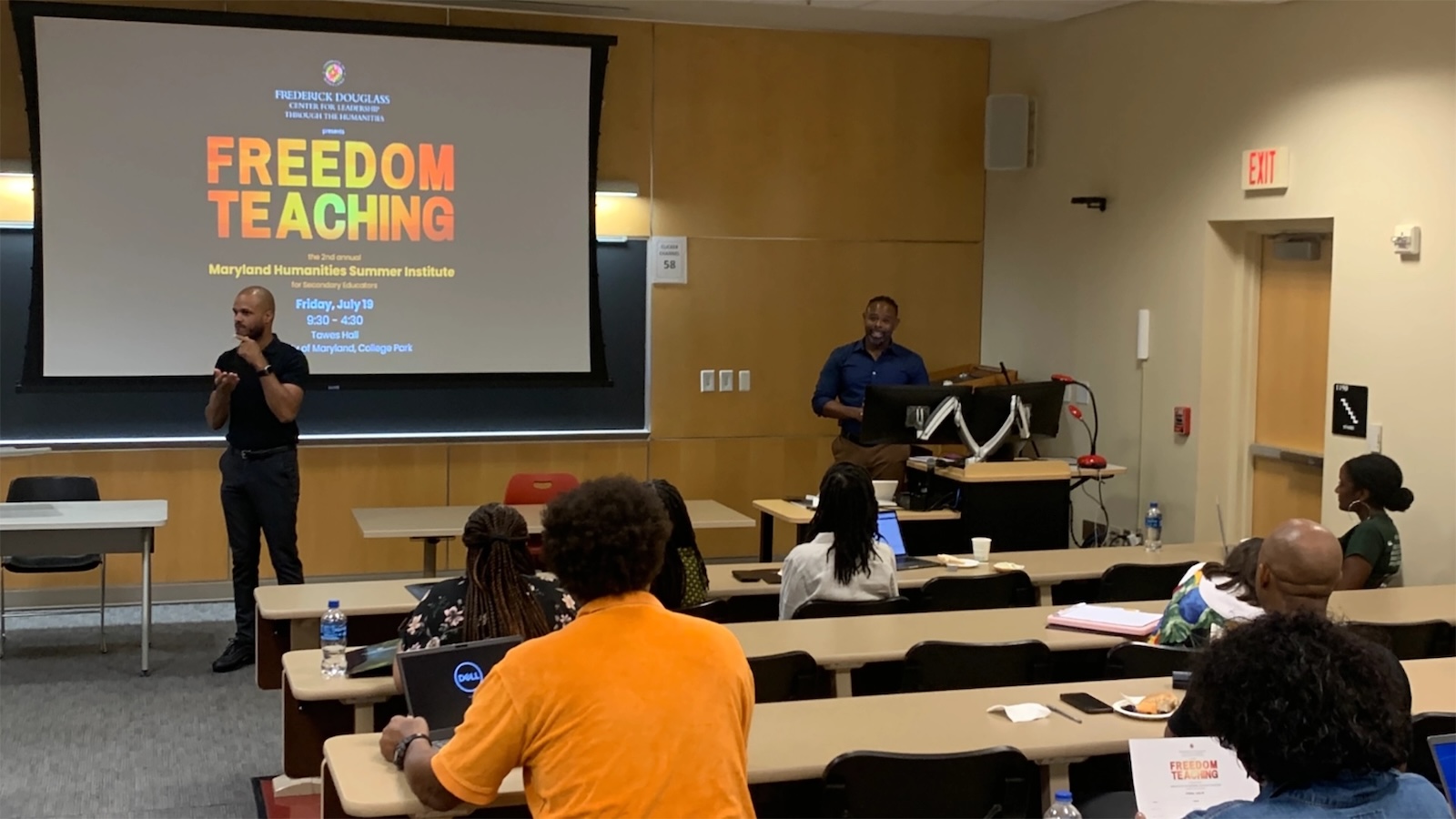Freedom Teaching: Douglass Center Connects Local Educators and UMD Professors to Share Tools
September 03, 2024

The Second Annual Summer Humanities Institute drew 60 area middle and high school educators to campus.
By Jessica Weiss ’05
In nearly 20 years working as a teacher, Samantha Averett has taught Lorraine Hansberry's 1959 play "A Raisin in the Sun" dozens of times. The story, about a Black family striving to move into a predominantly white neighborhood in Chicago, highlights the harsh realities of systemic racism, segregation and economic inequality.
But this past summer at the University of Maryland, Averett learned a whole new way to convey the play’s importance to students. At the Frederick Douglass Center for Leadership Through the Humanities’ summer institute, Averett listened to Associate Professor of English Julius Fleming, Jr. present his research on theater as more than a space for Black narratives—but also as a radical tool of civil rights protest, just like sit-ins and marches. In a session titled “Performing the Black Freedom Struggle,” Fleming gave 10 examples of theater works dating back to the 18th century that ignited Black political consciousness and civic participation.
Theater “was a strategy—it was a movement, a protest, a place of public history and public teaching; it was a freedom school of itself,” said Averett, who currently works as a social studies instructional coach at Roosevelt High School in Washington, D.C. “For me, that was really powerful. And I will go back to my space and talk about how we teach that.”
Averett was among nearly 60 area middle and high school teachers, counselors and administrators who took part in the second annual institute on campus in July. Inspired by the 60th anniversary of Freedom Summer, a 1964 campaign to register as many African American voters as possible in the state of Mississippi and provide educational opportunities to Black children in the state, this year’s workshops—led by both UMD faculty and local area teachers—explored topics related to the ongoing fight for freedom and aimed to give educators new insights and tools to take into their classrooms this fall and beyond. It also fostered community and connections.
In a “Byte Sized Culture” session, UMD English Professor Marisa Parham had participants cut up and remix classic poems to explore the creative potential of machine-generated text. In “Rosa Parks and Black Power,” Tiffany Mitchell Patterson, a social studies manager at DC Public Schools, led a gallery walk with images and quotes to challenge media stereotypes about Black Power. In a session on “Teaching Israel-Palestine,” longtime teacher Hubert Dixon III divided participants into small groups, assigning each a character from the conflict, like a Palestinian or an Israeli soldier, to discuss the issue from that perspective.
Rachel Givens, who teaches 11th and 12th grade social studies at Blake High School in Colesville, Maryland, said Dixon’s activity was helpful, as last year was the first in many as an educator she wasn’t sure she could teach on the conflict. “Personalizing it like that elicits empathy and understanding and makes it so that it’s not so cut and dried,” she said, adding that it also inspired a new lesson she plans to incorporate into material about the end of World War I.
ARHU Associate Dean and Douglass Center Director GerShun Avilez, professor of English, said the sessions exemplified how the humanities offer new ways to explore and address complex social problems. “We’re trying to ensure that people are exposed to new ideas and resources and techniques to build on what they already know,” he said.
Inaugurated earlier this year, the Douglass Center seeks to have a life both on and off campus, helping the university community and the public think about leadership and activism in the 21st century. It seeks to reach and connect teachers, community activists, artists and many others.
History and secondary education double major Isaac Mathew ’26, who aspires to work as a high school social studies teacher, said he appreciates the center’s emphasis on teachers as leaders.
“As a teacher, you’re always going to have to be a model for students; you're going to have to be someone who guides them,” said Mathew. “Pedagogy and these different techniques and tools are all ways to approach leadership in the classroom.”
He added that the opportunity to connect with experienced teachers and professionals this summer while he’s still a student “was a huge benefit.”
Shireen Lewis, the founder of SisterMentors, said she cherished the opportunity to “be in the company of people thinking this way and doing this work.” SisterMentors prepares girls of color from low income families for college and helps women of color doctoral students to earn their doctorate.
“I said I wasn’t going to stay the whole day, but I went and I didn’t want to leave,” she said.
Avilez said the Douglass Center will continue to work to create a community and a network of educators, to engage with one another but also with the university.
“We’re establishing long term connections,” he said. “I don’t just want teachers to come back, but I want them to be energized enough to lead workshops and share their knowledge as well.”
To accompany the summer institute, the Douglass Center will launch a scholars program next summer to bring high school students to campus for college preparation and career development.

